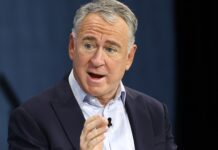The global economy has been ravaged by a pandemic, record inflation, protracted wars and skyrocketing interest rates over the past four years, fueling fears of a painful global downturn. But new forecasts released on Tuesday suggest the world has managed to defy the odds and avert the threat of a so-called hard landing.
International Monetary Fund forecasts painted a picture of economic sustainability – one that policymakers hoped to achieve as they tried to manage a series of cascading crises.
In its latest economic outlook, the IMF forecast global growth of 3.1 percent this year – the same pace as in 2023 and an increase from its previous forecast of 2.9 percent. Predictions of a global recession have receded and inflation is falling faster than economists expected. Central bankers, including the Federal Reserve, are expected to begin cutting interest rates in the coming months.
“The global economy has shown remarkable resilience and we are now in the final descent to a soft landing,” said Pierre-Olivier Gourinchas, the IMF’s chief economist
Policymakers who feared they would have to slow economic growth to curb rising prices have managed to curb inflation without plunging the world into recession. The IMF expects global inflation to fall to 5.8 percent this year and 4.4 percent in 2025, from 6.8 percent in 2023. It estimates that 80 percent of the world's economies in will see lower annual inflation this year.
The better outlook is largely due to the strength of the US economy, which grew by 3.1 percent last year. This robust growth came despite the Fed's aggressive series of interest rate hikes, which pushed borrowing costs to their highest level in 22 years. Consumer spending in America remained strong as businesses continued to invest. The IMF now expects the U.S. economy to grow 2.1 percent this year, up from its previous forecast of 1.5 percent.
China's economy is also growing faster than previously expected and is expected to grow by 4.6 percent this year. IMF officials said the difficulties facing China's real estate sector had not slowed the economy as much as they had predicted; They noted that the Chinese government had provided “significant” fiscal support.
Other major economies such as India and Brazil also appear to be performing better than forecast. Perhaps most surprisingly, Russia, which has faced a barrage of Western sanctions and export restrictions since its invasion of Ukraine in February 2022, received the largest appreciation of any country covered by the IMF. Despite coordinated efforts to cripple its economy, Russia's economy is expected to grow by a whopping 2.6 percent this year.
However, there is still a slowdown in some major economies. Geopolitical crises and industrial rivalries have hit the euro zone particularly hard, where new data released on Tuesday showed the economy stagnated in the final three months of 2023, growing just 0.1 percent for the year.
The IMF said the “particularly subdued” growth in Europe reflected “weak consumer sentiment, the ongoing impact of high energy prices and weakness in interest-sensitive manufacturing and business investment.”
There are other threats to the global economy, including geopolitical unrest in the Middle East. The war in Gaza and related attacks on ships by Iran-backed Yemeni rebels known as the Houthis in the Red Sea are of particular concern to the IMF. He warned that if these attacks escalate, they could lead to supply disruptions and “more persistent” “underlying inflation,” which could force central bankers to maintain higher interest rates for a longer period of time.
The IMF also expressed concern that President Biden is using industrial policy to subsidize America's clean energy and semiconductor sectors. Mr Gourinchas said such measures had led to a “recurrence” in trade restrictions that weighed on global production. He said he believes some of the measures implemented by the United States, such as rules requiring companies to use U.S.-made components to receive certain manufacturing tax credits, are inconsistent with international trade rules.
Still, Biden administration officials view these policies as one of the biggest factors contributing to America's economic recovery.
Speaking in Chicago last week, Treasury Secretary Janet L. Yellen noted that the American economy had outperformed the rest of the world, achieving stronger growth while inflation had cooled more quickly than in other large, advanced economies.
“Simply put, it was the fairest recovery in recorded history,” she said.

















